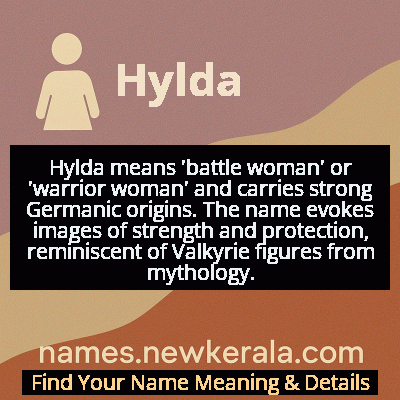Hylda Name Meaning & Details
Origin, Popularity, Numerology Analysis & Name Meaning of Hylda
Discover the origin, meaning, and cultural significance of the name HYLDA. Delve into its historical roots and explore the lasting impact it has had on communities and traditions.
Name
Hylda
Gender
Female
Origin
German
Lucky Number
5
Meaning of the Name - Hylda
Hylda means 'battle woman' or 'warrior woman' and carries strong Germanic origins. The name evokes images of strength and protection, reminiscent of Valkyrie figures from mythology.
Hylda - Complete Numerology Analysis
Your Numerology Number
Based on Pythagorean Numerology System
Ruling Planet
Mercury
Positive Nature
Adventurous, dynamic, curious, and social.
Negative Traits
Restless, impatient, inconsistent, prone to indulgence.
Lucky Colours
Green, white.
Lucky Days
Wednesday.
Lucky Stones
Emerald.
Harmony Numbers
1, 3, 9.
Best Suited Professions
Sales, marketing, travel, entertainment.
What People Like About You
Versatility, charisma, adventurous spirit.
Famous People Named Hylda
Hylda Baker
Comedian and Actress
Popular British music hall performer known for her catchphrase 'She knows, you know!'
Hylda Queally
Film Producer
Academy Award-nominated producer for 'The Reader' and 'The Hours'
Hylda Sims
Folk Singer and Writer
Founding member of the skiffle movement and published poet
Name Variations & International Equivalents
Click on blue names to explore their detailed meanings. Gray names with will be available soon.
Cultural & Historical Significance
The name's cultural significance extends beyond mythology into historical contexts where women bearing battle-related names were respected for their resilience and leadership. In Germanic tribes, women often participated in battle preparations and sometimes fought alongside men, making names like Hylda reflect real societal roles. The Christianization of Germanic peoples saw the name transition from purely warrior connotations to include spiritual strength and monastic leadership, as exemplified by Saint Hilda. This dual heritage makes Hylda a name that symbolizes the evolution of feminine power from physical combat to intellectual and spiritual leadership throughout European history.
Extended Personality Analysis
Women named Hylda are typically perceived as strong-willed, independent, and resilient individuals. They often possess natural leadership qualities and a determined spirit that helps them overcome challenges. Their warrior-name heritage tends to manifest as mental and emotional strength rather than physical aggression, making them excellent problem-solvers and reliable in crises. Hyldas are often practical, grounded individuals who value honesty and direct communication. They tend to be protective of those they care about and may display a maternal or nurturing side despite their strong exterior.
Beyond their evident strength, Hyldas often exhibit deep intuition and strategic thinking abilities, reflecting the wise decision-making associated with Valkyries who determined warriors' fates. They are typically organized and methodical in their approach to life's challenges, preferring practical solutions over theoretical ones. While they can be formidable when defending their principles or loved ones, they also possess a quiet warmth and loyalty that makes them cherished friends and partners. Their combination of strength and compassion makes them natural caregivers who can handle responsibility with grace and determination, often becoming the pillars of their families and communities.
Modern Usage & Popularity
Hylda is considered a vintage name that has seen limited modern usage, primarily in English-speaking countries with strong Germanic heritage connections. It peaked in popularity during the late 19th and early 20th centuries but has become quite rare in contemporary times. The name occasionally appears in families seeking unique traditional names or those with specific Scandinavian or German ancestry. While not currently ranking in most national name databases, it fits within the trend of reviving old-fashioned names with strong character and historical significance. The similar name 'Hilda' has seen slightly more usage, particularly in European countries like Sweden and Germany where traditional names remain popular. Modern parents choosing Hylda often appreciate its strong feminine connotations and historical depth, seeing it as an alternative to more common vintage revivals like Matilda or Eleanor.
Symbolic & Spiritual Meanings
Hylda symbolizes strength in adversity, feminine power, and spiritual protection. The name carries the metaphorical weight of a shield-maiden or guardian, representing someone who stands firm in challenging circumstances. It evokes images of ancient warrior women who balanced combat prowess with wisdom and strategic thinking. Symbolically, Hylda represents the integration of strength and compassion - the ability to fight for what is right while maintaining empathy and nurturing qualities. The name also carries connotations of fate and destiny, reflecting the Valkyrie's role in determining warriors' fates, suggesting someone who helps guide others through important life transitions. In a broader sense, Hylda symbolizes the transformative power of feminine strength that protects, guides, and empowers rather than dominates or destroys.

